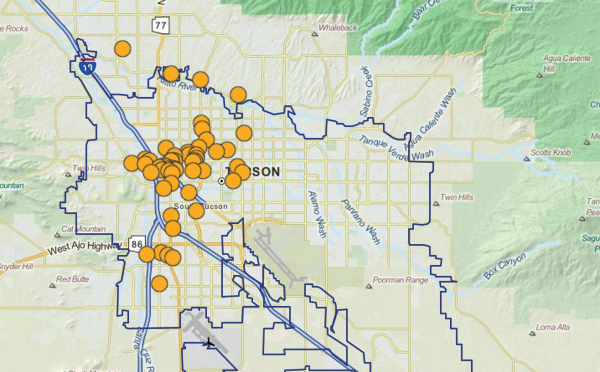The City of Tucson has launched a bike share survey and customizable map to find out where Tucsonans think bike share stations should be located.
The public input is part of a feasibility study being conducted by an outside company in cooperation with the city.
The map allows the public to suggest where bike share stations should be located across the city.
Tucson’s bicycle and pedestrian program manager Ann Chanecka said it looks like there will be about 30 stations at the launch of the system.
The map also allows users to comment on already suggested locations. So far about 50 locations have already been suggested.
In addition to the map, there is a 15-question survey asking for feedback about a bike share system in Tucson. The survey starts with this explanation of bike sharing systems:
Bike share provides a network of bicycles available at self-service kiosks around the city. Customers are able to access the bicycles with the use of a key card or fob, or through the use of their credit or debit card by purchasing a daily, weekly, monthly or annual membership. Most existing systems allow customers to make as many trips as often as they like without additional charge provided they return the bicycle to a station within 30-60 minutes (additional fees are typically incurred for keeping a bike beyond the time limit). Bike share is ideal for short distance trips and in many instances can provide a last-mile connection between transit and your final destination.
It asks users about how likely they would be to use the system and how much they would be willing to pay for the service.
Chanecka said they are beginning to look for money to launch the system and look for potential sponsors.
If the system proves viable, she said the launch would likely happen at the end of 2016.


I wish the city would look for money and a potential sponsor for an effective street sweeper.
½ of my commute is on the bike boulevard, ½ on arterials and I repeatedly see more bike traffic on the arterials.
And what kind of a bike boulevard is it that consistently enacts a bike sting operation on it?
I totally agree. A bike share program is a total waste of money. First off it would likely be located near the streetcar which increases the safety risks. Secondly its somewhat illogical to have it near the streetcar because people are then using the streetcar for transit not a bike. He only people that really need to rent bikes on a daily basis are students around the university campus that are here part time and here’s already a bike share program at the university that’s FREE! Any out of town visitors that would want to bike around are probably renting a car and then will rent a road bike or mountain bike to get their riding in.
Tell me a situation where someone would need to or want to use the bike share program? Most people that commute already have bikes and if not, after constantly renting a bike then they mind as well buy one.
Another side note – the company that the city hired to do the study profits from bike share programs so of course the company is going to find it feesable that Tucson have a bike share program, because guess what when one goes in – their company gets additional money than just the consulting fees. Also the city will be spending a little under $1 million dollars to start up the bike share program then it’ll cost a bunch to maintain it, probably more than they will make in revenue so then there’s more wasted money that could be used toward sending more people out to clean up our streets more frequently and patch up rough sections of the road or other various changes that would make riding conditions for the rest of us commuters and recreational cyclist safer.
Aside from the disgusting(*) and mindless “Keeping up with the Joneses” aspect of this “proposal,” it is interesting to note that the Bicycle Tucson piece does not identify the consultant (“outside company” is all you get) nor does COT DOT on any of its readily-accessible webpages. Perhaps it’s nobody’s business?
Under the circumstances, Red Star will not dignify the astoundingly biased survey.
* when there are so many more unaddressed basic infrastructure needs such as potholes and gators on the bike boulevards we have.
Just what we need free drunk cycles